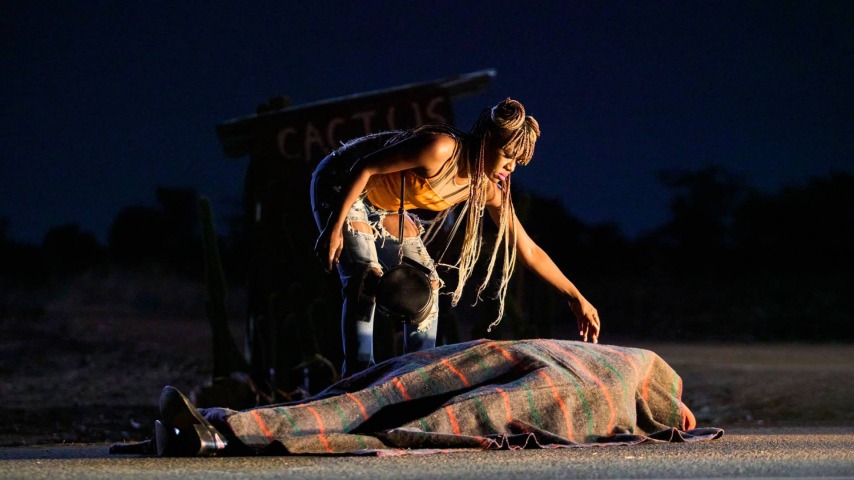A death in the family leads to chaos in the brilliant, shifting On Becoming A Guinea Fowl
The searing second film from Rungano Nyoni escalates its stress until hard-earned catharsis.
Photo: A24
On Becoming A Guinea Fowl opens on a sardonic note, as an upwardly mobile Zambian woman named Shula (Susan Chardy) drives down a dark lane late at night. She’s just come from a fancy dress party, and is dressed as Missy Elliott from the “The Rain (Supa Dupa Fly)” video—you know, the one where she wore the big inflated bodysuit? Shula passes a man who appears to be passed out by the side of the road; she gets out to investigate, still wearing that puffy costume, and discovers that not only is the man dead, it’s her Uncle Fred.
The scene that follows is like something from a Luis Buñuel movie, but with an African twist. Guinea Fowl pokes fun at the absurdities of life in modern-day Zambia, where nothing works and everyone is corrupt. Our protagonist is international in her sensibilities, and seems to have spent some time abroad; she works for a foreign company, and wants little to do with the traditional customs of her home country. The reasons for that become obvious over the course of Rungano Nyoni’s blistering second feature, as biting wit transforms into righteous fury.
With Shula as our exasperated guide, On Becoming A Guinea Fowl gradually reveals why she isn’t sad that Fred died, and neither are her cousins Nsansa (Elizabeth Chisela) and Bupe (Esther Singini). The first hint comes a half-hour in, as Nsansa—previously depicted as a fool, loud and drunk and always causing a scene—tells a traumatic story from her childhood. She laughs, but it isn’t funny at all. Her messiness is a coping mechanism, and she instantly changes from a comedic character into a tragic one.
The shift in tone happens gradually, as the contrast between the real Uncle Fred and the Uncle Fred whom Shula’s aunties are mourning in public becomes ever more enraging. Nyoni is contemptuous towards the hypocrisy of what the film calls “God’s people,” and the impunity of Zambian men who expect their wives to wait on them while they spend their paychecks on booze and brothels. But her harshest condemnation is of women who uphold the patriarchy, along with a call to break these oppressive cycles.
 Keep scrolling for more great stories.
Keep scrolling for more great stories.
